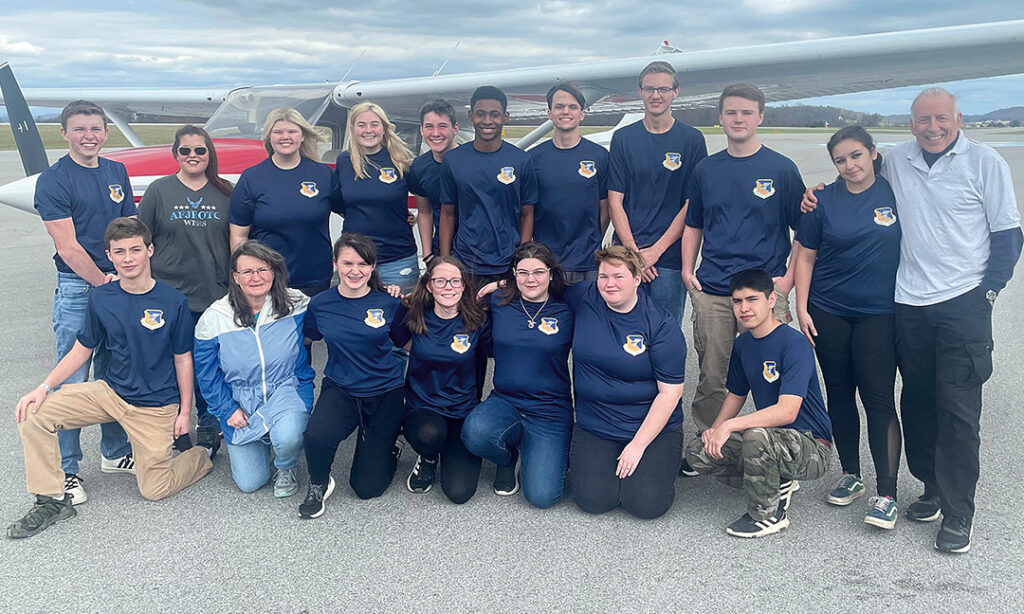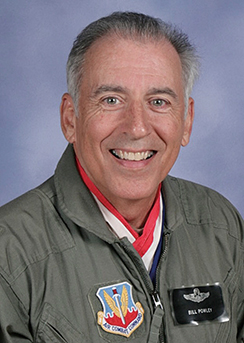
By A.J. Kaufman, Managing Editor
A decorated Vietnam veteran, Lieutenant Col. Bill Powley happily continues his lifelong mission. The endeavor started when he retired from the U.S. Air Force in January 1991 and was hired by Unicoi County High School.
“I made the comment, let’s take them flying, to get them excited about something, and I guess that worked pretty well because six years later, we were a distinguished unit and were for the rest of my time there,” Powley explained to the Business Journal. “The flying program was kind of like a magnet to keep kids in the program and get kids to join. It was magnificent.”
The biggest challenge was initially getting the school board to approve a flying program as part of the JROTC curriculum. The board voted 4-3 in favor. Powley notes that one vote, 30 years later, has allowed everything afterwards — including the accolades — to occur.
“We created the need, because not too many other units had this. Everyone around here now thinks this is normal because we’ve been doing it for 30 years. This is anything but normal,” Powley said. “That’s why we’ve been recognized three times as the top program in the nation, which is a pretty nice thing.”
He earned an appointment to the United States Air Force Academy in 1963, went to pilot training, and after graduation, deployed to Vietnam as part of the 497th Tactical Fighter Squadron, known as the “Nite Owls.”
He was assigned to the first A-7 squadron in the Air Force, the 353rd Combat Training Squadron. Powley did two combat tours in Vietnam and flew 347 missions.
“My first years were so exciting; everything after that was kind of anti-climactic,” Powley joked.
In 2010, Powley won the top aerospace science instructor in the nation (A. Scott Crossfield Award); was the first recipient of the Tennessee Aviation Person of the Year Award; in 2011, he earned the Tennessee Career Contributions to Aviation Award; and in 2013, he was inducted into the Tennessee Aviation Hall of Fame for leading this program.
Powley was inducted last summer into the Flight Instructor Hall of Fame at EAA AirVenture in Wisconsin.
“I do not claim to be the best flight instructor in the nation,” Powley said. “But I do claim to have the best program in the nation, and that’s the reason I think I was inducted as leader of that program.”
Indeed, his programs have been selected as tops in the country several times.
Flight Lesson Instructional Grants Helping Teens (FLIGHT) Foundation is a non-profit chartered foundation formed to ensure the continuance of an already established aerospace education program in Air Force Junior ROTC at Unicoi County High School. In 2002, the program moved to Sullivan County, and six years ago, they relocated to Greene County, where he’s a flight coach.
Since its beginnings more than three decades ago, they have made nearly 5,000 flights with over 13,300 students doing orientation flights, mostly by retired Air Force Lieutenant Colonel Bill Powley, a former F-4, A-7 and F-16 fighter pilot.
In 1999, a year after the founding, FLIGHT received a NASA grant, and from 2000-2018, benefited from a Tennessee Aeronautics Division grant. This grant money is used along with funds from local, regional, and national donations to sponsor the flight program.
Overall, nearly 300 students from more than 30 different high schools and eight colleges have earned their solo wings, and since 2002, roughly 47 students have received their private pilot’s license.
In 1998, the first solo cadet went to the Air Force Academy (USAFA), and since then a total of eight solo students have received appointments to USAFA, three to West Point and one to Annapolis. Eighteen solo students have enrolled in the flight program at Middle Tennessee State University as professional pilots and several at other colleges, including Auburn University, Embry-Riddle Aeronautical University, Liberty University and Purdue University.
With emphasis needed on math and science skills, character education, discipline, leadership, and team building, this program provides an opportunity to accomplish all of these goals as well as provide the basis for future careers in aviation or the Armed Forces.
Powley claims he is proudest of how many kids the program helps — at least 600 per year.
“What keeps me going is when kids get off the airplane and say it is the neatest thing they’ve ever done in their life,” Powley claimed. “How cool is that? That is very motivating for me to keep doing this forever.”
As he approaches age 80, Powley has a “legacy plan,” which involves training younger people down the road. He says there are donations and an income stream that can last a long time.
“There is no sense for this to end just because I’m not around,” he added.




